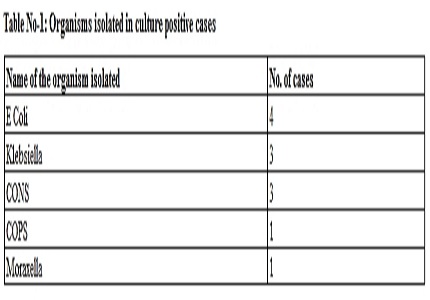Bacteriological spectrum and immediate outcome of neonatal sepsis in tertiary care centre in South India
Abstract
Introduction: Neonatal septicemia is diagnosed when generalized systemic features of sepsis are associated with pure growth of bacteria from one or more sites. It refers to systemic infection of neonates including Septicemia, Pneumonia, Meningitis, Arthritis, Osteomyelitis and UTI.
Objective: To study the bacteriological profile and antibiotic sensitivity of neonatal sepsis and correlating to outcome.
Materials and Methods: This is a prospective hospital based study in NICU of ASRAM medical college, Eluru.
Period of study: January, 2014 to July, 2015 Selection of cases: 74 Neonates below the age of 28 days with clinical suspicion of neonatal septicemia were included in this study.
Results: Early onset septicemia was present in 49 cases (66%), Late onset septicemia was present in 25 cases (34%). E-coli, Klebsiella and CONS were the most common organisms isolated. Present study shows Gram negative organisms show maximum sensitivity to Imipenem (87.5%). Gram negative organisms show least sensitivity to cefotaxime (25%).
Conclusion: Early-onset septicemia is more common than late-onset septicemia. Gram-negative septicemia is more common than Gram-positive septicemia. Gram-negative organisms are common cause of early-onset septicemia. Mortality is higher in early-onset septicemia and Gram-negative septicemia.
Downloads
References
2. Report of National Neonatal Perinatal Database (National Neonatology Forum)2002-2003.
3. P. Jyothi et al. Bacteriological profile of neonatal septicemia and antibiotic susceptibility pattern of the isolates. J Nat Sci Bio Med 2013 ;4(2):306-309.
4. Rajarshi Basu, Syamalkumar Bandyopadhyay et.al. Study on correlation between sepsis screening and blood culture in neonatal sepsis. IOSR journal of Dental and Medical Sciences (IOSR-JDMS) 2014; 13:(5) 52-56.
5. Shrestha NJ et.al. Bacteriological profile of neonatal sepsis: A Hospital Based Study. J Nepal Paediatr Soc Jan-April2011; 31:(1) 1-5.
6. Shipra Galhotra et al. Clinico-bacteriological profile of neonatal septicemia in a tertiary care hospital. Journal of Mahatma Gandhi Institute of Medical sciences.2015;20:(2) 148-152.
7. Rabindra N Misra, Savita V Jadhav, Purbasha Ghosh, Nageswari Gandham, Kalpana Angadi, Chanda Vyawahare et. al. Role of sepsis screen in the diagnosis of neonatal sepsis. Medical journal of Dr. D.Y.Patil University.2013; 6:(3 ) 254-257.
8. Mehrotra N et al. Neonatal sepsis, correlation of maternal and neonatal factors to positive blood cultures. Indian pediatrics 1985;22;(4) 275-280.
9. Khatua SP, Das AK, Chatterjee BD, Khatua S, Ghose B, Saha A. Neonatal septicemia. Indian J Pediatr. 1986 Jul-Aug;53(4):509-14.
10. Chaturvedi P, Agrawal M, Narang P. Analysis of blood culture isolates from neonates of a rural hospital. Indian Paediatrics 1989 ; 26 :(5) 460-465
11. Nellian AR, Choudhury Panna, Shrinivasan S, Nalini P, Puri RK. A prospective study of bacterial infections in the newborn.Indian Journal of Pediatrics 1981; 48 :(4) 427-431.
12. Mathur NB. Neonatal sepsis. Indian Pediatr. 1996 Aug;33(8):663-74. [PubMed]
13. Moreno MT, Vargas S, Poveda R, Sáez-Llorens X. Neonatal sepsis and meningitis in a developing Latin American country. Pediatr Infect Dis J. 1994 Jun;13(6):516-20. [PubMed]
14. Berger A, Salzer HR, Weninger M, Sageder B, Aspöck C. Septicaemia in an Austrian neonatal intensive care unit: a 7-year analysis. Acta Paediatr. 1998 Oct;87(10):1066-9. [PubMed]
15. Koutouby A, Habibullah J. Neonatal sepsis in Dubai, United Arab Emirates. J Trop Pediatr. 1995 Jun;41(3):177-80. [PubMed]

Copyright (c) 2017 Author (s). Published by Siddharth Health Research and Social Welfare Society

This work is licensed under a Creative Commons Attribution 4.0 International License.


 OAI - Open Archives Initiative
OAI - Open Archives Initiative


